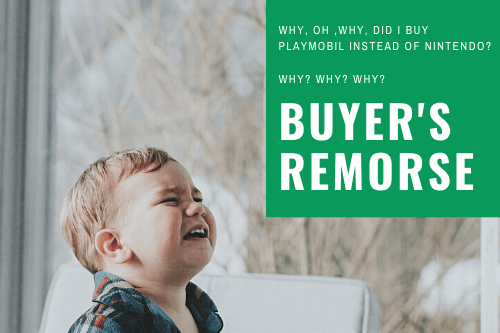
YouTube / iTunes / Spotify / Radio Public / Pocket Casts / Google Podcasts / Breaker / Overcast
Listen to ArtisanEnglish.jp posts & lesson intros here.
WotD: Buyer’s remorse
It’s one of life’s little consistencies—highs are followed by lows, which are followed by highs, which are, in turn, followed by more lows.
Yeah, life sure has its ups and downs.
One of those downs is what we call buyer’s remorse.
Buyer’s remorse is a feeling of regret after buying something too expensive or unnecessary. It’s the low after a shopping high.
People shop for various reasons, but I would say the two main reasons are necessity and retail therapy.
After living in Kansai for more than 20 years, I’ve realized that I’ve been infected with the real Kansai character.
Yes, I speak Japanese with Kansai intonation, but more importantly, I LOVE A BARGAIN!
I also love anything that is ‘limited edition’ or available for a ‘limited time only.’
If you put a discount price tag on it, it’ll be in my cart faster than you can say Okinii.
In my youth, I had been known to follow the ‘sticker lady’ around the grocery store after 6 PM to see what bargains I could pick up.
Like or follow ArtisanEnglish.jp on social media.
Unfortunately, all that uncontrolled discount shopping leads to buyer’s remorse or a feeling of regret after buying something too expensive, not my problem, or unnecessary.
There, I am guilty as charged.
I have about ten flashlights I got on sale that don’t work.
I purchase canned chu-hai when it comes with a little free basket and kiwi fruit when they come in a brightly coloured bucket.
My shibaken Sora has enough snacks and treats to last for a year because I purchased them all at 50% – 70% off.
I even get beer, rum and whiskey at a discount – WELCOME TO KANSAI!
The problem is, we don’t need any of that stuff; it’s all extra.
Buying it is excellent – it’s like a little win for the average guy, but I somehow feel like I’m being manipulated, and that gives me buyer’s remorse.
Flesch-Kincaid Readability Test
This post is understandable by someone with at least an 8th-grade education (age 13 – 14).
On the Flesch-Kincaid reading-ease test, this post scores 67.
The higher the score on a scale of 0 – 100, the easier the passage is to read.

